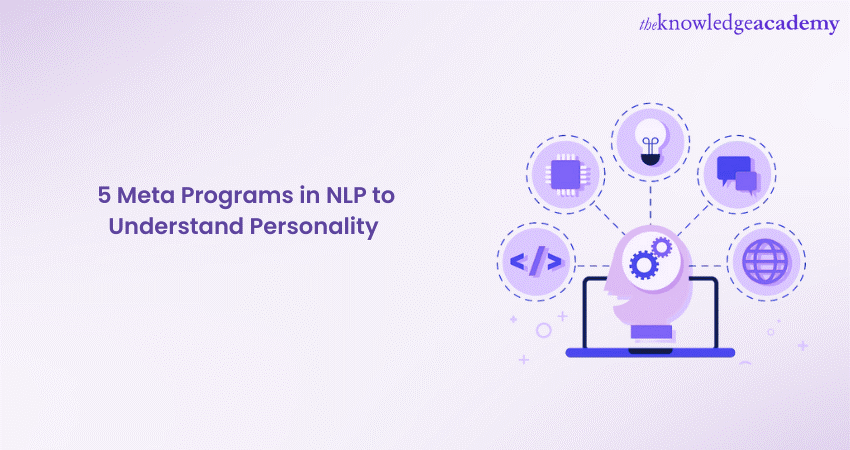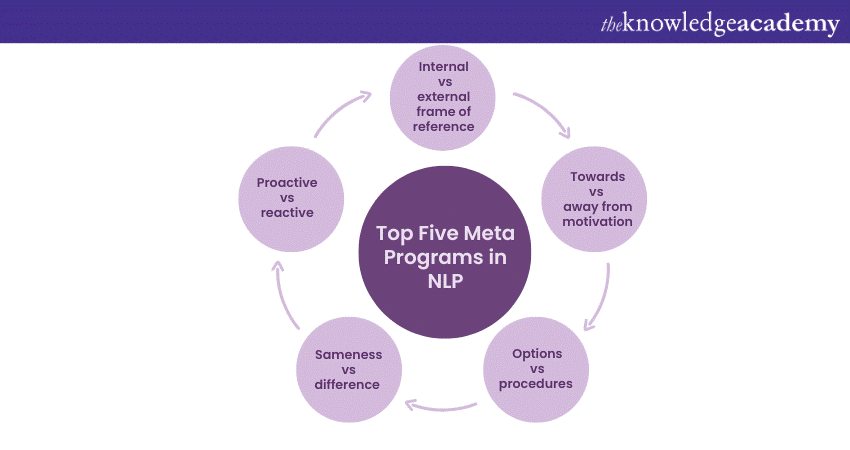We may not have the course you’re looking for. If you enquire or give us a call on +44 1344 203999 and speak to our training experts, we may still be able to help with your training requirements.
Training Outcomes Within Your Budget!
We ensure quality, budget-alignment, and timely delivery by our expert instructors.

In the world of Neuro-Linguistic Programming (NLP), understanding the human mind and behaviour is paramount. Meta Programs, a key concept within NLP, offer insights into how individuals process information, make decisions, and interact with the world. Further, in this blog, we will discuss the 5 Meta Programs in NLP which can help you improve the quality of your life.
If you wish to gain a deeper understanding of various personalities and effectively influence others, this blog is what you need. Keep reading this blog to learn about 5 Meta Programs in NLP and better understand people's personalities.
Table of Contents
1) What is Meta Programming in NLP?
2) Top Five Meta Programs in NLP
a) Internal vs external frame of reference
b) Towards vs away from motivation
c) Options vs procedures
d) Sameness vs difference
e) Proactive vs reactive
3) Importance of Meta Programs in NLP
4) Conclusion
What is Meta Programming in NLP?
Meta Programming, a fundamental concept in Neuro-Linguistic Programming (NLP), explores the cognitive and behavioural patterns that shape our perception, interpretation, and response to situations. These patterns act as filters, influencing how we process information, make decisions, and construct our unique reality.
Meta Programs are the mental processes operating at an elevated level, driving our thoughts, emotions, and actions. They provide insights into the patterns and tendencies that motivate individuals, offering a framework for understanding and predicting human behaviour. They are rooted in past experiences, beliefs, values, and cultural conditioning. Meta Programs serve as mental shortcuts or filters to help us navigate the daily influx of information.
Understanding Meta Programs enables a deeper comprehension of ourselves and others, enhancing communication and influencing skills. Meta Programs manifest across various human cognition and behaviour aspects, such as perception, attention, decision-making styles, motivation, and communication preferences. Recognising these patterns empowers NLP practitioners to tailor their strategies, resolve conflicts, motivate others, and foster effective relationships.
Top Five Meta Programs in NLP
Meta Programs encompass a wide range of cognitive and behavioural patterns that shape how we perceive and interact with the world. Here are 5 Meta Programs that shed light on decision-making styles, motivational tendencies, perception of information, and how individuals evaluate themselves and others:

Internal vs external frame of reference
The internal vs external frame of reference Meta Program explores how individuals perceive and evaluate themselves and others. Some individuals rely on internal standards and personal experiences to judge themselves and make sense of the world. They have a self-referencing approach where they trust their own internal judgment and values.
On the other hand, individuals with an external frame of reference depend on external benchmarks and opinions. They look to others for validation and rely on societal or cultural norms to assess themselves and their surroundings. Understanding this Meta Program is crucial for effective communication and influencing others. When interacting with someone with an internal frame of reference, it is essential to acknowledge their unique perspective and value their personal experiences, as this can impact the Cause and Effect of NLP.
Providing logical explanations and appealing to their individual values can be persuasive. In contrast, individuals with an external frame of reference are more influenced by social proof and authority. Building trust, using testimonials, and appealing to societal norms can be effective in communicating and influencing them.
Towards vs away from motivation
The towards vs away from motivation Meta Program examines the driving forces behind individual behaviour. Some individuals are motivated by moving towards positive outcomes and seeking pleasure. They are goal-oriented, driven by aspirations, and inspired by achieving desired outcomes. Conversely, individuals with an away from motivation are motivated by avoiding negative outcomes and alleviating pain. They are more focused on preventing unwanted situations and seeking security and safety.
Understanding this Meta Program helps understand how individuals are motivated and can guide communication and persuasion strategies. When dealing with individuals with Towards Motivation, highlighting the benefits, rewards, and positive outcomes can be influential. Painting a vivid picture of the desired future and providing incentives can motivate.
In contrast, individuals with an Away from Motivation are more responsive to avoiding negative consequences. Emphasising the potential risks and consequences of inaction can be persuasive in communicating and influencing them. NLP Training can also help in tailoring the message to address these concerns effectively.
Options vs procedures
The options vs procedures Meta Program focuses on decision-making styles. Individuals who prefer options enjoy considering multiple possibilities, exploring alternatives, and thriving in open-ended situations. They are creative, flexible, and enjoy having choices. On the other hand, individuals with a preference for procedures prefer clear, step-by-step processes and established routines. They feel more comfortable when they have specific guidelines and a structured approach.
Understanding this Meta Program is crucial in facilitating effective decision-making processes and communication. When working with individuals who prefer options, providing them with choices, brainstorming sessions, and encouraging creativity can be beneficial. Allowing them to explore different possibilities and providing freedom in decision-making can enhance their engagement. In contrast, individuals who prefer procedures thrive in a structured environment. Providing clear instructions, setting clear goals, and outlining step-by-step processes can help them feel more comfortable and supported.
Sameness vs difference
The sameness vs difference Meta Program highlights how individuals perceive and categorise information. Individuals with a preference for sameness seek similarities and patterns. They tend to focus on commonalities and look for consistency in their experiences.
On the other hand, individuals with a preference for difference are more inclined to identify distinctions and variations. They notice unique features and appreciate diversity. Understanding this Meta Program is valuable for effective communication and building rapport.
Interacting with individuals who prefer sameness, highlighting shared values, common ground, and emphasising consistency can foster connection. Emphasising familiarity and aligning with their existing beliefs can strengthen rapport. In contrast, individuals who prefer difference appreciate uniqueness and diversity. Acknowledging their individuality, valuing their perspectives, and promoting diversity can help establish trust and rapport, as outlined in the 4 Pillars of NLP.
Proactive vs reactive
This Meta Program centres around how individuals respond to events and challenges. People with a proactive orientation take the initiative, plan, and are action-oriented. They tend to anticipate and prepare for future situations, making decisions and taking steps to achieve their goals. Proactive individuals are more likely to view challenges as opportunities for growth and take responsibility for shaping their outcomes.
Conversely, individuals with a reactive orientation respond to events after they occur, often more passively or defensively. They may feel compelled to react based on the circumstances presented to them rather than taking the initiative to create their desired outcomes. Reactive individuals may be more susceptible to being influenced by external circumstances and feel overwhelmed or powerless in the face of challenges.
NLP practitioners can use this understanding to assist clients in shifting from reactive to proactive mindsets, empowering them to take charge of their lives and move towards their goals with purpose and determination.
Discover three main learning styles of NLP with our Neuro Linguistic Programming Course!
Importance of Meta Programs in NLP
Meta Programs play a crucial role in NLP, providing valuable insights into human behaviour and facilitating effective communication and influence. Understanding the importance of Meta Programs allows practitioners to navigate interpersonal dynamics, tailor their approaches, and foster personal growth. Here are some key points highlighting the significance of Meta Programs in NLP:
1) Self-awareness: Meta Programs offer individuals a deeper understanding of their own cognitive and behavioural patterns. This self-awareness allows them to recognise their strengths, limitations, and preferences, empowering them to make conscious choices and take proactive steps towards personal growth.
2) Understanding others: By recognising Meta Programs in others, practitioners can gain insights into how individuals process information, make decisions, and respond to stimuli. This understanding enhances empathy and facilitates more effective communication, improving relationships and outcomes.
3) Tailoring communication: Different Meta Programs influence how individuals prefer to receive and process information. Understanding these patterns enables NLP practitioners to adapt their communication styles to match the preferences of others, ensuring that their messages are more effectively received and understood.
4) Conflict resolution: Meta Programs can illuminate the underlying patterns contributing to conflicts and misunderstandings. By identifying and addressing conflicting Meta Programs, practitioners can facilitate resolution and promote harmony by finding common ground and fostering mutual understanding.
5) Motivation and goal setting: Meta Programs provide insights into individuals' motivational tendencies. Some people are driven by moving towards desired outcomes, while others are motivated by avoiding undesirable consequences. Understanding these Meta Programs allows practitioners to tailor motivational strategies and set goals that align with individuals' intrinsic motivations.
6) Influencing and persuasion: Meta Programs influence how individuals respond to persuasive techniques. By understanding the Meta Programs of others, practitioners can employ strategies that resonate with their specific patterns, increasing the effectiveness of their influence and persuasion efforts.
Learn the details of the human thought process with our NLP Training courses!
Conclusion
The 5 Meta Programs in NLP discussed throughout the blog provide invaluable insights into the patterns and tendencies that shape human behaviour. Understanding and leveraging these programs can allow you to enhance your communication skills, deepen your understanding of personality dynamics, and foster meaningful connections with others.
Try our NLP Foundation and Practitioner Training course to persuade others with your words!
Frequently Asked Questions
Upcoming Business Skills Resources Batches & Dates
Date
 Neuro Linguistic Programming
Neuro Linguistic Programming
Fri 17th Jan 2025
Fri 21st Mar 2025
Fri 16th May 2025
Fri 18th Jul 2025
Fri 19th Sep 2025
Fri 21st Nov 2025







 Top Rated Course
Top Rated Course



 If you wish to make any changes to your course, please
If you wish to make any changes to your course, please


